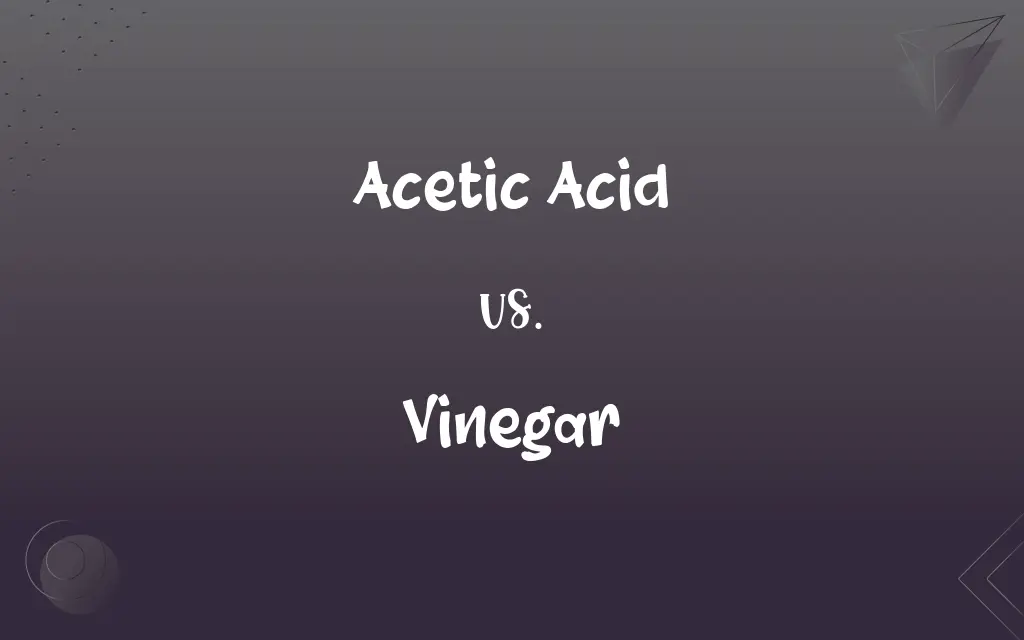Acetic Acid vs. Vinegar: What's the Difference?
Edited by Aimie Carlson || By Janet White || Published on December 14, 2023
Acetic acid is a clear, corrosive organic compound with a pungent smell, while vinegar is a liquid containing acetic acid, water, and other compounds.

Key Differences
Acetic acid is a chemical compound, often clear and with a strong, sour smell. It is the main component that gives vinegar its sour taste and pungent smell. Vinegar, on the other hand, is a solution where acetic acid is diluted in water, often containing additional flavors and compounds.
Pure acetic acid, also known as glacial acetic acid, is used in various industrial and chemical applications due to its acidic properties. Vinegar, being a diluted form of acetic acid, is commonly used in cooking, cleaning, and preserving food.
Acetic acid can be produced synthetically or by fermenting ethanol. Vinegar is created through the fermentation process, which involves the action of bacteria converting alcohol into acetic acid.
In terms of concentration, acetic acid is much stronger and can be corrosive, making it useful for industrial purposes. Vinegar typically contains 5-20% acetic acid by volume, making it safe for consumption and household use.
Acetic acid in its pure form is hazardous and requires careful handling, while vinegar is widely used in households for culinary purposes, as a cleaning agent, and in natural remedies due to its mild acidity and flavor.
ADVERTISEMENT
Comparison Chart
Composition
A clear, corrosive organic compound.
A solution of acetic acid, water, and other compounds.
Concentration
Highly concentrated; can be corrosive.
Diluted; typically 5-20% acetic acid.
Production
Produced synthetically or by fermentation.
Made through fermentation of ethanol.
Uses
Industrial, chemical applications.
Cooking, cleaning, food preservation.
Handling
Requires careful handling due to corrosiveness.
Generally safe for everyday use.
ADVERTISEMENT
Acetic Acid and Vinegar Definitions
Acetic Acid
Acetic acid has strong acidic properties.
Acetic acid is often used in laboratories for acid-base reactions.
Vinegar
Vinegar is a liquid consisting of acetic acid, water, and other substances.
Vinegar is commonly used as a salad dressing.
Acetic Acid
Acetic acid can be produced through the fermentation of sugars.
Acetic acid is formed in wine when it turns to vinegar.
Vinegar
Vinegar is produced through the fermentation of alcoholic liquids.
Apple cider is fermented to produce apple cider vinegar.
Acetic Acid
Acetic acid is used as a preservative in the food industry.
Acetic acid helps in preserving the pickles by preventing bacterial growth.
Vinegar
Vinegar is used as a flavoring agent in cooking.
A dash of vinegar can enhance the flavor of sauces.
Acetic Acid
Acetic acid is a colorless organic compound with a pungent odor.
Acetic acid is used in the synthesis of various chemicals.
Vinegar
Vinegar has preservative qualities, making it suitable for pickling.
Vegetables are often pickled in vinegar for long-term storage.
Acetic Acid
Acetic acid is the main component of vinegar.
The sour taste in vinegar is due to acetic acid.
Vinegar
Vinegar serves as a natural cleaning agent due to its acidity.
Vinegar is effective in removing limescale from kettles.
Vinegar
A sour liquid containing acetic acid, produced by fermenting a solution (such as wine or fermented rice) containing ethanol produced by a previous fermentation, used as a condiment and preservative.
Vinegar
Sourness of speech or mood; ill temper.
FAQs
What is vinegar?
A liquid containing acetic acid, water, and other compounds.
Is vinegar just diluted acetic acid?
Yes, it's acetic acid diluted with water and other substances.
Can acetic acid be used in cooking?
In its pure form, it's too strong but used as vinegar.
How is acetic acid produced?
Through synthetic methods or fermentation of ethanol.
What is acetic acid?
A clear, corrosive organic compound with a strong odor.
Can vinegar be used as a cleaning agent?
Yes, it's effective in cleaning due to its mild acidity.
What are the uses of vinegar in cooking?
As a flavoring agent, preservative, and in pickling.
Is acetic acid harmful?
In its concentrated form, it can be corrosive and harmful.
What’s the concentration of acetic acid in vinegar?
Typically between 5-20%.
Is acetic acid found in all types of vinegar?
Yes, it’s the key acidic component in vinegar.
Can acetic acid be found in household products?
Yes, but usually in diluted forms like vinegar.
What’s the pH level of vinegar?
Usually around 2.5 to 3.5.
Can acetic acid be used as a preservative?
Yes, particularly in the food industry.
Can vinegar spoil?
It has a long shelf life but can change in flavor and appearance over time.
How is vinegar made?
By fermenting alcohol (like wine or cider) into acetic acid.
Is vinegar used in traditional remedies?
Yes, often in home remedies and natural treatments.
Are there different types of vinegar?
Yes, including white, apple cider, balsamic, and others.
Is vinegar good for health?
It has various health benefits but should be consumed in moderation.
How should acetic acid be stored?
In a cool, dry place, away from direct sunlight and heat.
What are the safety precautions for handling acetic acid?
Use protective gear and ensure proper ventilation.
About Author
Written by
Janet WhiteJanet White has been an esteemed writer and blogger for Difference Wiki. Holding a Master's degree in Science and Medical Journalism from the prestigious Boston University, she has consistently demonstrated her expertise and passion for her field. When she's not immersed in her work, Janet relishes her time exercising, delving into a good book, and cherishing moments with friends and family.
Edited by
Aimie CarlsonAimie Carlson, holding a master's degree in English literature, is a fervent English language enthusiast. She lends her writing talents to Difference Wiki, a prominent website that specializes in comparisons, offering readers insightful analyses that both captivate and inform.






































































